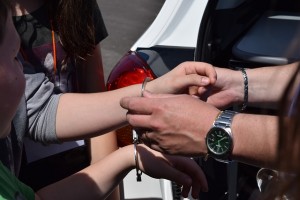It is illegal to drive while high on marijuana (weed, pot, etc.) in New Jersey. Although New Jersey does not have a specific law that addresses driving under the influence of marijuana, the same law that prohibits drunk driving (N.J.S.A. 39:4-50, titled “Driving While Intoxicated”) applies to drugged driving offenses as well. This law prohibits driving under the influence of any intoxicating substance, including narcotics, hallucinogens or even some over the counter medications.
How Do the Authorities Prove a Person is Under the Influence of Marijuana?
When a person is pulled over on suspicion of drunk driving, they are given a breathalyzer test to determine their blood alcohol content. So how does a police officer know whether a driver is under the influence of marijuana? Usually, a driver will be asked to take a blood or urine test. However, a positive drug test only indicates that there is marijuana in a person’s system at the time of the traffic stop—and marijuana can stay in a person’s system weeks after using it. Therefore, if you are arrested for drugged driving, additional evidence is generally relied upon to prove the DUI in court.
If you go to trial for your DUI charge, the State must prove beyond a reasonable doubt that you were operating a vehicle under the influence of marijuana. This requires some expert testimony to establish that the drugs found in your system were not just residual, but actually rendered you impaired and unable to safely operate a motor vehicle.
In drugged driving cases, the general rule is that the accused must have been tested at the time of their arrest by a specially trained police officer referred to as a Drug Recognition Expert (“DRE”). However, for marijuana cases, the prosecutor can establish intoxication through testimony of any police officer who has been trained in field sobriety and who has experience in identifying marijuana intoxication. In such cases, an officer will testify that there was objective evidence that a driver’s physical or mental capabilities were impaired by the drug. This testimony can be the State’s Achilles heel. An experienced DWI lawyer may be able to have your charges either dismissed or downgraded by discrediting this testimony.
No Implied Consent for Blood or Urine Testing
In New Jersey, as a condition of receiving your driver’s license, you have agreed to take a breath test to determine the content of alcohol in your system if you are pulled over on suspicion of drunk driving. This is known as “implied consent.” If you refuse to take the test, you are subject to punishment including a loss of driving privileges. But this law does not extend to drivers who are suspected of being under the influence of marijuana or other substances. If you are pulled over and the police suspect that you are high on marijuana or some other substance, there are no penalties or sanctions if you refuse to submit to a blood or urine test. Chemical testing for marijuana or any other substance is only performed on a voluntary basis or if a warrant has been issued by a judge. First, the investigating officer would ask you for your consent to provide a urine or blood sample. If you refuse, then the officer can attempt to obtain a warrant from a judge, based upon probable cause. If a warrant is issued, then you have to comply. It is amazing just how many people, knowing full well they have a substance in their system, agree to voluntarily submit to a blood or urine test. Most people just don’t know they can say no.
Penalties for Driving Under the Influence of Marijuana
Penalty for a conviction will vary depending on whether you have ever been convicted of drugged driving in the past.
- For a first conviction, drivers face a fine of between $300 and $500, up to 30 days in jail, and between seven months and one-year license suspension.
- For a second conviction, drivers face a fine of between $500 and $1,000, 30 days community service, 2 to 90 days in jail, and a two-year license suspension.
- For a third (or subsequent) conviction, drivers face fines up to $1,000, 180 days in jail, and a ten-year license suspension.
If you have been charged with drugged driving, you may also face additional penalties for related charges such as possession of a controlled dangerous substance.
What About Medical Marijuana?
Although New Jersey allows certain individuals to use medical marijuana, just like any other legally prescribed medication, it is still a crime to drive if one’s ability to safely drive a car is impaired by the drug.
Edward M. Janzekovich Defends People Charged with Marijuana DWI/DUI
If you were arrested for driving while impaired by marijuana, we can help. Trusted New Jersey DWI lawyer Edward M. Janzekovich is available to answer your questions and discuss your best defense. Call us today at 732-257-1137 or contact us online today. We serve clients throughout New Jersey, including Ocean County, Monmouth County, Mercer County, Middlesex County, Union County and Somerset County.



 In New Jersey, if you are convicted or
In New Jersey, if you are convicted or 